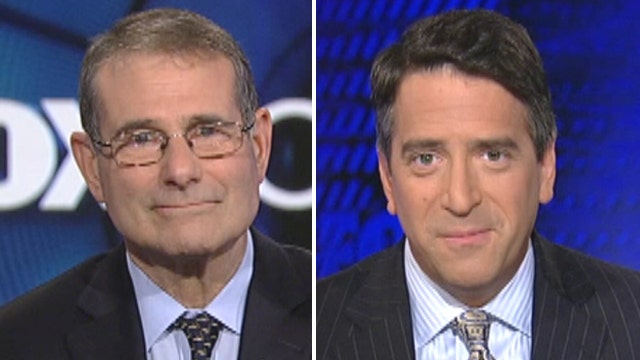Thomas Stossel on big pharma without tears
Fox News' James Rosen speaks to 'Pharmaphobia' author Thomas Stossel
A recent headline in the satirical news outlet The Onion trumpeted: "Doctor Makes Half-Hearted Alternative Suggestions Before Handing Over Drugs." The article described the action unfolding in the office of a faux "local physician" treating a patient for anxiety:
ARLINGTON, VA—Rapidly running through a list of non-pharmaceutical options that might resolve his patient’s anxiety issues, local physician Alan Caplan offered a series of half-hearted alternatives Friday before handing out drugs. "You could consider various lifestyle changes such as eating better and exercising more," said Caplan, even as he uncapped his pen and reached for his prescription pad. "Some people try meditation to help them relax." At press time, Caplan had fallen totally silent as he scribbled the dosage instructions for the anti-anxiety medication Cymbalta.
What makes The Onion’s article funny – what makes so much of The Onion funny, and what makes for successful comedy in general – is an essential sense of shared understanding, or understandings, between the teller of the joke and his audience. We wouldn’t laugh at Dr. Caplan if we didn’t harbor, within ourselves, some view of a massive and malevolent Diagnosto-Industrial Complex that governs modern American medicine, wherein doctors and big pharmaceutical companies collude profitably in the systemic numbing of millions of heavy-lidded souls, going about their workaday lives in a perpetual state of legally narcotized stupor.
Such a vision, in any case, made for a good laugh in The Onion – and is precisely the kind of thing that drove Dr. Thomas P. Stossel to write "Pharmaphobia: How the Conflict of Interest Myth Undermines American Medical Innovation" (Rowman & Littlefield, April 2015). An accomplished hematologist and researcher at Boston’s Brigham & Women’s Hospital and the American Cancer Society professor of medicine at Harvard Medical School, Stossel’s book portrays the prevailing indictment of Big Pharma as an addictive cocktail of “moralistic bullying, opinion unsupported by empiric evidence, speculation, simplistic and distorted interpretations of complicated and nuanced information, superficially and incompletely framed anecdotes, inappropriately extrapolated or irrelevant psychological research results, and emotionally laden human-interest stories.”
To Stossel (brother of Fox Business Network host John, and father to bestselling author and Atlantic editor Scott, a previous “Foxhole” guest), even to define the parameters of Big Pharma in the traditional ways employed by the news media – i.e., as a $400 billion industry, wherein ten firms control a third of the market and profit margins often exceed 30 percent – is to perpetuate the "conflict of interest myth."
"I'm old," Stossel said in a recent visit to "The Foxhole." "I've been in practice for almost fifty years. And mostly what you hear about health care is all the problems – problems with access, cost; and outcomes. But the fact is it's incredibly better today than when I started out."
Stossel cited statistics indicating that Americans enjoy longer lives, and are 60 percent less likely to die of a heart attack or stroke, than back in the mid-1960s. "The dominant reason for those amazing improvements are the tools that health care providers have, that have come from the medical products industry, drug and device companies."
STOSSEL: [A]bout three decades ago, folks that I call "pharmaphobes" came out of the woodwork and denied all these facts: "Oh, no, the industry doesn't innovate. It just profiteers. And just harms people." And the worst of all: If physicians or researchers work with the industry – which is essential to get that innovation to come up out – they become corrupt, like the industry itself, and for money they do flawed research or they harm patients. None of it's true and the purpose of the book is to set the record straight.
ROSEN: You wouldn't say that there has been a single episode in which some rogue elements within the pharmaceutical industry behaved as alleged?
STOSSEL: Any industry or any enterprise that is as huge as the medical products industry and the interface with medical care, of course there are going to be rogues. And if they do bad things, they should be taken out and punished.
ROSEN: What's the most egregious case that you know of?
STOSSEL: Well, the fact is, if you read the book, you will find that it – the cases that are raised, in the fullness of time and under close scrutiny, aren't what they're cracked up to be….So who are the pharmaphobes? Well, it's academics who discover they can make a living beating up on industry. They [and] – with all due respect – the media that finds [sic] that corruption sells, whether it's real or not. And by the time it's been shown not to be true, it's old news and doesn't come back on again.
These forces, Stossel alleges, have combined to make it exceedingly difficult for new medicines, vaccines, and cures to be brought to market. He told me that approval for a new drug by the Food and Drug Administration now takes an average of sixteen years, at a cost of $2.6 billion. "That is 100 times more expensive than when I started out."
Would it color your view of Dr. Stossel’s defense of Big Pharma if you knew he himself had previously received funding from the industry? Should that fact govern our response to "Pharmaphobia" – or would that itself represent a mindless succumbing to the "conflict of interest myth"? What if you knew further that the sums Stossel has received enabled him and his wife to perform charity work in a remote village in rural Zambia?
Click here to watch the full episode of "The Foxhole" with Dr. Thomas Stossel.









































